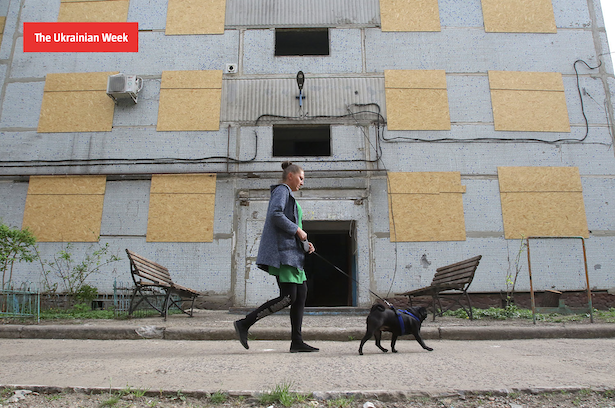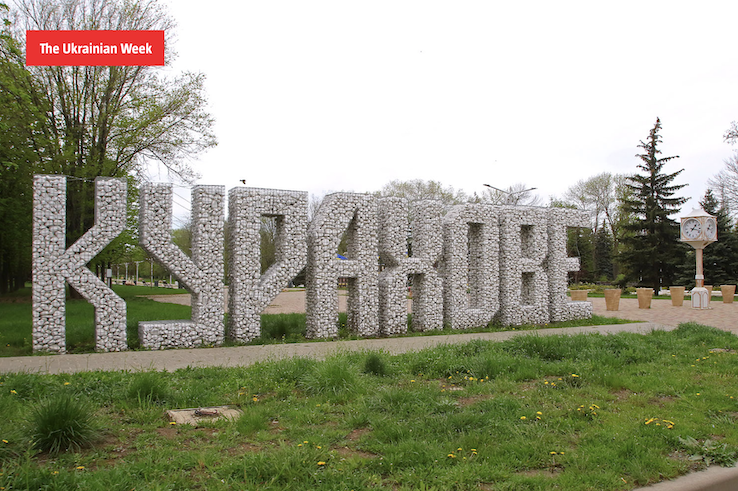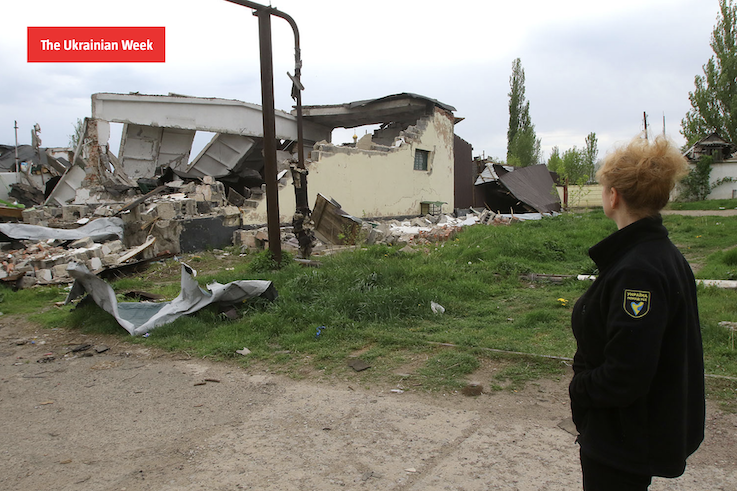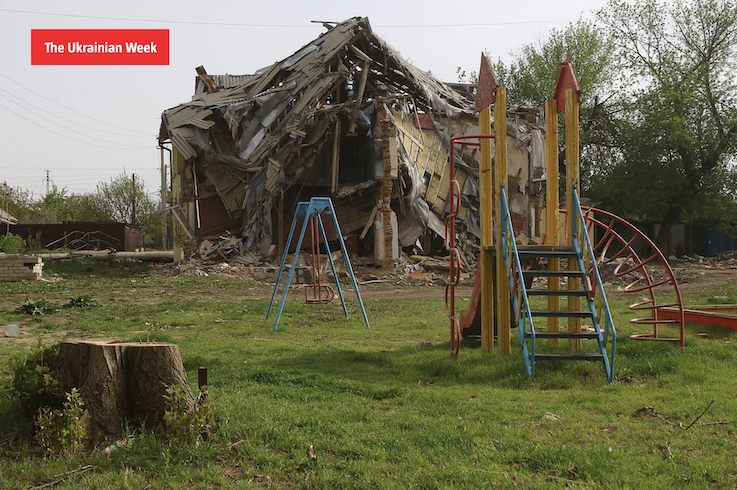Roman Malko from The Ukrainian Week explores the harrowing experiences of Kurakhove city residents in the Donetsk region amidst the ongoing Russian invasion. From enduring relentless shelling to facing winters without heating, Malko talks to the city’s deputy mayor, Natalia Puzhaylo and locals to uncover the struggles and resilience of those living in this war-torn area.
***
In Kurakhove, peace is a distant memory. War has become a constant reality for over a decade now. Just 35 kilometres away from the occupied Donetsk border, and once only 15 kilometres from the front line, now even closer, barely 10. The city has endured relentless shellings.
At the outset of the war a decade ago, the situation was not as severe as it is right now. Back then, crossing the confrontation line was feasible, albeit requiring navigation through numerous checkpoints. People from the occupied territories even used to come to Kurakhove for the market, and some travelled from here to Donetsk for medical treatment. Many residents who refused to live under occupation settled in Kurakhove, gaining the status of internally displaced persons (IDPs), occasionally returning home to check on their properties. However, all ties with Donetsk were severed with the onset of COVID-19 and the subsequent implementation of quarantine measures. Travel to the occupied territories was permanently restricted thereafter.
But Kurakhove has undoubtedly borne the brunt over the past two years of full-scale war. The relentless shelling, coming from all possible directions, systematically ravages this once-picturesque town. People are slowly but surely fleeing, leaving neighbourhoods eerily deserted. However, the city refuses to succumb. Somehow, it musters the resilience to persevere, to resist, and even to hold onto hope for the future. During my stay in the town, I had the opportunity to sit down with Deputy Mayor Natalia Puzhaylo. We delved into the daily lives of Kurakhove’s residents, discussing how they navigate survival amidst constant shelling, what it’s like enduring winters without heating, and the intricate process of evacuating people from highly dangerous areas.

Photo: Roman Malko
– Over the past decade, Kurakhove has found itself on the front lines. As the full-scale war intensifies, conditions have become increasingly dire. How do you cope with survival in such challenging circumstances?
– We’ve adapted to it. We were right at the heart of all these events. People came here from Donetsk and the surrounding villages—from all directions, really. By the start of 2022, according to official statistics, we had 16.5 thousand internally displaced persons. They came from the occupied territories and areas near the front lines—Marinka, Krasnohorivka. Our community consists of 41 thousand residents, plus this additional 16.5 thousand.
As soon as the full-scale war began, people started fleeing. They come to us frequently and in large numbers. Russian artillery, rockets, cluster munitions—everything’s hitting us. There are casualties and wounded. Today, we only have 14.5 thousand residents in our community. Plus, since February 2022, another 6400 new internally displaced persons have joined us. Well, you can imagine that some people want to flee as far away as possible from this nightmare, while others who don’t want to go too far end up here. However, we urge everyone, especially those with children, to leave. Currently, there are still 920 children in the community. In the Uspenivsky district (which includes four villages: Uspenivka, Trudove, Hannivka, and Veselyi Hai), forced evacuation has been announced. Almost all the children have been taken away by their parents, and only two remain. But they are also going to be evacuated.
– Do you have the authority to remove them and their children, or do you try to convince them?
– We persuade them. We tell them where they can go, etc. We understand that it’s hard to leave your homeland, but the children… For example, a woman lived with her children in Katerynivka, there was shelling, and their house was destroyed. She moved to her mother in Uspenivka, and now they must leave again. Out of the 28 settlements in our community, one is already in the combat zone. It’s the village of Hostre. There are still 81 people there, but no children. They were evacuated in advance.

Photo: Roman Malko
– Has the city experienced significant damage during the two years of full-scale war?
– The devastation has been immense. Not a single house here has intact windows. Entire multi-story buildings lie in ruins. Tragically, there have been instances where people lost their lives right in their own homes.
Our school used to serve as a humanitarian hub where aid was distributed. In 2022, a rocket struck the building. Thankfully, it happened at night, and no one was injured. However, the school was targeted again by rockets later on. There’s still a pile of humanitarian aid sitting there. Despite what the news might have said about the hub being destroyed, locals relied on it solely for humanitarian assistance.
Even cafes frequented by young people haven’t been spared. Who were they harming? They were closed, deserted—no one was using them. Some might speculate that locals passed on information, maybe suggesting a military presence, but in reality, there was no one even nearby. Russians shell schools, kindergartens, hospitals…

Photo: Roman Malko
– Is there a high number of casualties resulting from such shelling?
– A Russian ‘Grad’ rocket struck the local market during the day, resulting in seven fatalities.
– Is there a way to know when the shelling starts so people can take cover? Do they have any predictable pattern of this bombardment?
– No, there’s no way to predict it beforehand. You might hear some distant rumbling, and instantly, everyone rushes to find cover. Some head to the basement, others to designated safe areas, like a reinforced entrance or the common corridor in dormitories. All windows are already sealed, and flashlights are kept handy in case the power goes out. And when it’s quiet, the tension mounts because you wonder if they’re gearing up for an attack. Can you imagine the shock when seven rockets rain down in just half an hour? Mentally, no one was prepared for that. We held onto hope for a peaceful resolution, believing in victory. And we still do…
Russians used to shell us mainly at night, but now it happens even during the day. One rocket struck the central street, hitting a building and causing a blast. It was around half past two on a Sunday. Can you imagine? Despite the curfew from 9 p.m. to 5 a.m. on weekdays, people rarely venture out after 4 p.m. on weekends. But on weekends, some still risk going to the store.
Bomb shelters are scattered throughout the city, prepared for daytime attacks. We ensure the entrances are accessible and urge residents not to lock the doors of their buildings. In certain buildings, all residents have already departed, leaving the apartments empty.
– And how do you cope with these conditions?
– My children left right away. I practically kicked them out, to be honest. The rockets have hit my house four times already. Artillery hit the roof twice, and then one landed nearby, close to the kindergarten. It’s a lovely kindergarten called ‘Kazka’. Two rockets struck it with a 15-second interval. It happened at midnight. The entire kitchen was destroyed. Fortunately, I was in another room, huddled in a corner, not where I usually spend my time. And then there’s the “Gostinnyi Dvir,” a hotel nearby. It has no roof, no windows, no doors left.

Photo: Roman Malko
– So you don’t have windows in your house?
– Yeah, we’ve boarded them up, and we’re just living day by day. Out of the entire building, which has 41 apartments, only three families remain. Three more families come to visit; they’ve relocated nearby.
But as long as people are here, as long as our help is needed, how can we just leave? How many people with limited mobility are still here? There are cases where children moved out a long time ago, or a son passed away, and the grandmother hasn’t been able to move for four years. Neighbours call us — what should we do? We find a way; we arrange transportation, we provide care…
Well, maybe someone is just sitting and waiting…
– Are there people like that?
– I think there are. You know how it goes: some relatives are here, others are there. Take, for example, this grandma who says her daughter calls her: “Mom, don’t go anywhere, we’ll be there soon, I’ll pick you up.” Where is she “going to be soon”? And if she “will be here,” there won’t be anyone left. Russians “liberated” Marinka. They “liberated” everyone from their homes, from their jobs, from life, from everything — reducing these people’s entire lives to rubble. “Liberated,” as they say, of course. I understand that there are already ninety-year-old grannies – their children promised them…
– How did the city survive winter? It depends on the thermal power plant, which is no longer working.
Last winter, they managed to maintain some heating to prevent the radiators from freezing. We have quite a few high-rise buildings, you see. But come December, after yet another round of shelling, they completely cut off the water. There was no heating whatsoever. The stations weren’t allowed to operate. Just a bit of smoke from the pipes and Russian rockets immediately landed in that direction.
Thankfully, volunteers stepped in with heaters. With electricity still available, volunteers and charitable foundations distributed heaters to entrances and basements. Some residents installed them in their apartments. Firewood, pallets, and coal were brought in, and people also collected wood from fallen trees. They did remarkably well, considering the circumstances. Additionally, the Points of Invincibility stayed open round the clock, offering warmth and hot drinks.
Having technical water available is a relief; they [authorities – ed.] stick to a schedule when supplying it. At first, they relied on river water, but then, spurred by the military administration’s initiative, they revived the wells of the Uspenivsky water intake, which had been dormant for decades. They underwent cleaning, pipeline installation, and filter setup. However, the situation with drinking water is trickier. Even before the full-scale invasion began, the supply was erratic. We transport it in containers using special vehicles. That’s our reality.

Photo: Roman Malko
– I get that there aren’t many job opportunities in the city. Most businesses are shut down, so how do people make a living?
– Some sectors are still operational: communal services, shops, small businesses, and the service industry. However, it’s true that many have closed down. The thermal power plant is still running, albeit slowly, repairing equipment, and they haven’t let go of employees. Some have been relocated to other areas to prevent job losses. There’s a significant number of education workers here, most of whom are now working remotely with students. However, the bulk of the population, around 60%, comprises retirees.
– Are children who stay in the city or move here able to attend school and kindergartens?
– In Kurakhove itself, there are still nearly 250 children. Neither schools nor kindergartens are functioning here. Children are attending classes remotely, and kindergartens are also operating online. They gather them around computers and conduct lessons with them. There’s a strong desire not to lose these children. We understand that when parents leave, they enrol their children where they settle and send them to study there. But they miss each other a lot; they really lack communication.
– Could you please let me know what kind of assistance you need the most today? Is there anything that you lack at the moment?
– Building materials are crucial. Charitable foundations do provide them, but we require a significant amount. As I mentioned, my house was hit four times, and each time, we had to completely seal it up. We’re also in need of electrical tools because they wear out with extended use. Municipal equipment is another necessity…
– Is it worth restoring damaged buildings and making repairs in this situation?
– When it comes to repair work, it’s mostly about clearing the aftermath of shelling. We don’t see the point of doing major repairs right now because everything just gets destroyed again. We’ll do a full renovation after the war. By the way, only two blocks remain for us to reconstruct until we’re fully restored. We’ve repaved all the sidewalks, fixed the roads, renovated the buildings… The city is constantly being cleaned today; grass is cut, plants are cared for, and trash is collected.
After the strikes, we board up the windows and cover the roofs, at least with tarpaulin, to prevent flooding and to somehow preserve the housing stock. We close everything we can. On some buildings, roofs have been covered ten times over. Initially, when we had asbestos cement sheets, we used those to cover the roofs. Now we don’t have them, so we use tarpaulin. Thankfully, building materials are provided. The Red Cross, “Proliska,” and “Angels of Salvation” help a lot; they work with building materials, and we already cooperate well with them. They also bring food – we feed the people…

Photo: Roman Malko
– Is it only volunteer assistance?
– We organise both volunteer and state assistance. We receive help through the regional administration and ensure that everyone in the community is covered and assisted. Additionally, we have the “Recovery” programme in place. Those whose homes are completely destroyed have already received certificates and purchased houses in safer regions of Ukraine.
– Can you explain the evacuation process? Do you assist people in finding suitable housing or settling down afterwards?
We operate an evacuation bus service to Dnipro daily, excluding Sundays, which commenced in March 2022. For those without accommodation, we provide assistance. Every eight days, there is an evacuation to the Rivne region and now to the Volyn region via a train with accommodation. People register beforehand, and we transport them to the train, where volunteers receive and accompany them and then help settle them in communities. Those with relatives to stay with can take the Lviv evacuation service daily. Many find housing independently in nearby villages to avoid going too far. Volunteers assist those with disabilities or mobility issues in evacuating. We collaborate with organisations such as Save Ukraine, who directly pick them up, along with the Chaplain Patrol and East SOS.
– Can those who don’t want to go far and resettle receive assistance here?
– Before the full-scale Russian invasion, we used a former kindergarten to accommodate displaced persons and allocate rooms to them. However, we can’t continue due to the constant shelling here. We strongly advise everyone to evacuate. Additionally, we operate a temporary stay centre for internally displaced persons (IDPs), providing accommodation for a day or two when they’re evacuated from shelling or conflict zones. Those adamant about staying put find lodging here and settle in. For those who’ve endured enough fear and choose not to leave anymore, we arrange transportation by bus to Dnipro, or we register them for the train. Alternatively, we transport them to Pokrovsk. From there, a train heads to Lviv, equipped with an evacuation carriage.
Interestingly, when there is calm, it’s rare, but when it happens, people start to come back. They get together, go out to their gardens, rummage around their summer cottages, and tidy up around the house. People here are optimistic. As soon as the shelling starts again, they leave again. Sometimes, we send out two buses a day. I understand they come to see their homes and take some things. Because everyone had plans — I’ll leave for a month or two, and then I’ll come back… Some take furniture and belongings with them.
– It’s no secret that the Russians aim to seize all of the Donetsk region…
– God forbid! We hope for the best and that it won’t happen…
– Do you have any backup plan should the situation seriously deteriorate?
– I don’t want to think about it, no, not at all. I do realise that Russian missiles will continue to strike, but I’m confident our forces won’t allow them to penetrate here. Naturally, we’ll evacuate if the situation worsens. We’re proactive about it. Personally, I engage with grandmothers. I explain, “You realise we can assist you now, but there may come a time when a volunteer can’t reach here.” That’s what’s happening with evacuations from Krasnohorivka; direct battles are already occurring in the city. Our White Angels volunteers are heading there, evacuating amidst gunfire. And I question, why should someone risk their life for you? It’s crucial to leave in advance. I empathise with all the grandmothers who say, “How much longer do I have to live? I’m not going anywhere, or I have nowhere to go.” I understand them. However, we persuade those with children to depart on time.
Certainly, those who departed earlier were presented with better options. There was this lady from Hеоrgiivka; she lamented, “Where will I live there? I need certain conditions.” I responded, “You’ve spent your whole life in the village, so return there, where the conditions will be familiar to you. There, you’ll only need to cover utilities. Pay for electricity based on your usage.” I know many friends and relatives who relocated and indeed, paid no rent. Renting in Kyiv, Dnipro, or even smaller towns is expensive. For an apartment, you know, the rent is steep; grandmothers can’t afford it. I get that. However, on the flip side, if there are children, I always emphasise that it’s their moral obligation to support their parents. They never held back anything for the sake of their children.
– Aren’t you upset that you have to endure all of this while others live in normal conditions elsewhere, maybe not even thinking about the war?
– I’m not sure. But whenever I visit Kyiv or Dnipro, I feel a sense of injustice. It’s frightening how we’ve become accustomed to this horror of living. We’ve even turned off street lights in the evening. People have covered their windows everywhere to avoid any glimmer of light. But when I’m there, life is entirely different: everything is illuminated, bustling with activity… Here, it’s different. Our thoughts are focused elsewhere.

